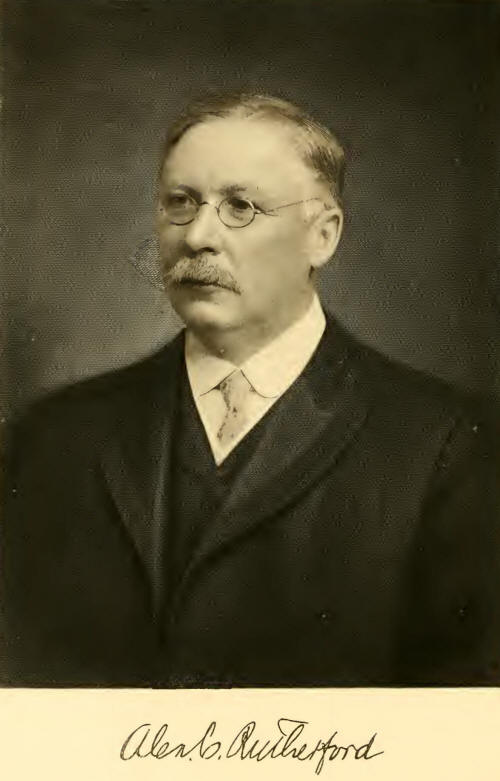|

Hon. Alexander Cameron
Rutherford, first Premier of the province of Alberta and a member of the
senate of the University of Alberta since 1907, is the senior partner in
the firm of Rutherford, Jamieson, Rutherford & McCuaig, barristers and
solicitors, which maintains offices in the McLeod building of Edmonton
and in the Imperial Bank Chambers of Edmonton South. His birth occurred
at Osgoode, Carleton county, Ontario, on the 2d of February, 1857, on
his family's dairy farm. His parents being James and Elizabeth
Rutherford, had immigrated from Scotland two years previously. He
received his early education in the public and high schools of Metcalfe,
Ontario, continued his studies in Woodstock College of Woodstock and
prepared for a professional career iii McGill University. The Hon. Dr.
Rutherford engaged in law practice in Ottawa, Ontario, from 1885 until
1895 and then came west to Strathcona (South Edmonton), Alberta. Here he
has remained an active representative of the bar to the present time,
now practicing as senior member of the firm of Rutherford, Jamieson,
Rutherford & McCuaig. He is also a factor in business circles as
director of the Canada National Fire Insurance Company, director of the
Imperial Canadian Trust Company and director of the Great West Permanent
Loan Company. He is a member and one of the founders of Local No. 1 of
the United Farmers of Alberta.
Dr. Rutherford was a
member of the Ottawa Inter-Provincial Conference in 1906, vice president
of the Dominion Lord's Day Alliance in 1907 and also delegate to The
Imperial Conference on Education in London, England, in the latter year.
He was presented to the late King Edward and was specially invited to
the Royal Garden Party at Windsor Castle in 1907. His public career has
been of a varied and highly important character. He was elected to the
legislative assembly of the Northwest Territories for Strathcona
constituency in 102 and three years later was elected to the legislative
assembly of Alberta, to which he was re-elected in 1907. On the
formation of the province he was selected its first Premier by
Lieutenant Governor Bulyea and was called to form a ministry on the 2d
of September, 1905. He served as Premier, minister of education and
provincial treasurer during the period between 1905 and 191.0 and
resigned the Premiership on the 26th of May, of the latter year, owing
to dissension in the ranks of Liberal members in the legislature. Under
his regime as premier of Alberta the Normal College and Provincial
University were founded and all the institutions and machinery of
government were established as in other provinces of Canada. The Hon.
Dr. Rutherford is an ardent supporter of high educational standards and
is responsible more than any other man in Alberta for the found- lug of
a state-controlled University and for keeping degree-granting power in
the hands of the Provincial University. He was the first exponent of
railway expansion for Alberta by guarantee of bonds and he encouraged
agriculture, coal mining, judicious labor legislation, and state control
of telephones.
In 1888, in Ottawa,
Ontario, the Hon. Dr. Rutherford was united in marriage to Miss Mattie
Birkett, daughter of the late William Birkett. They are the parents of a
son and a daughter, namely: Cecil, who served with the artillery in
France and is a member of his father's law firm; and Hazel, the wife of
Stanley H. McCuaig, of the firm of Rutherford, Jamieson, Rutherford &
McCuaig.
The Hon. Dr. Rutherford
has been a Liberal-Conservative in politics since 1911, prior to which
time he was a Liberal. He is a Baptist in religious faith. He is a
fellow of the British Association for the Advancement of Science and the
Royal Colonial Institute of London, England, honorary colonel of the One
Hundred and Ninety-fourth Battalion of the Canadian Expeditionary Forces
and was director of National Service for Alberta of the National Service
Commission during the period of the Great war. The Montreal Herald
referred to him as "a man of fine ability," while the Toronto Globe
characterized him as "an honest, up right figure in politics. A big man
physically and mentally with a radiant humor in his eyes, and lines of
stubborn strength finely blended in his genial face." |
